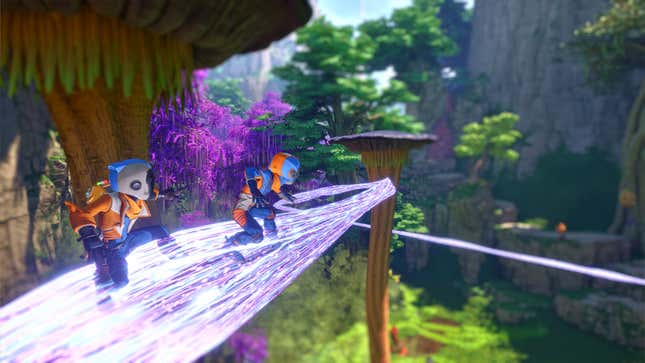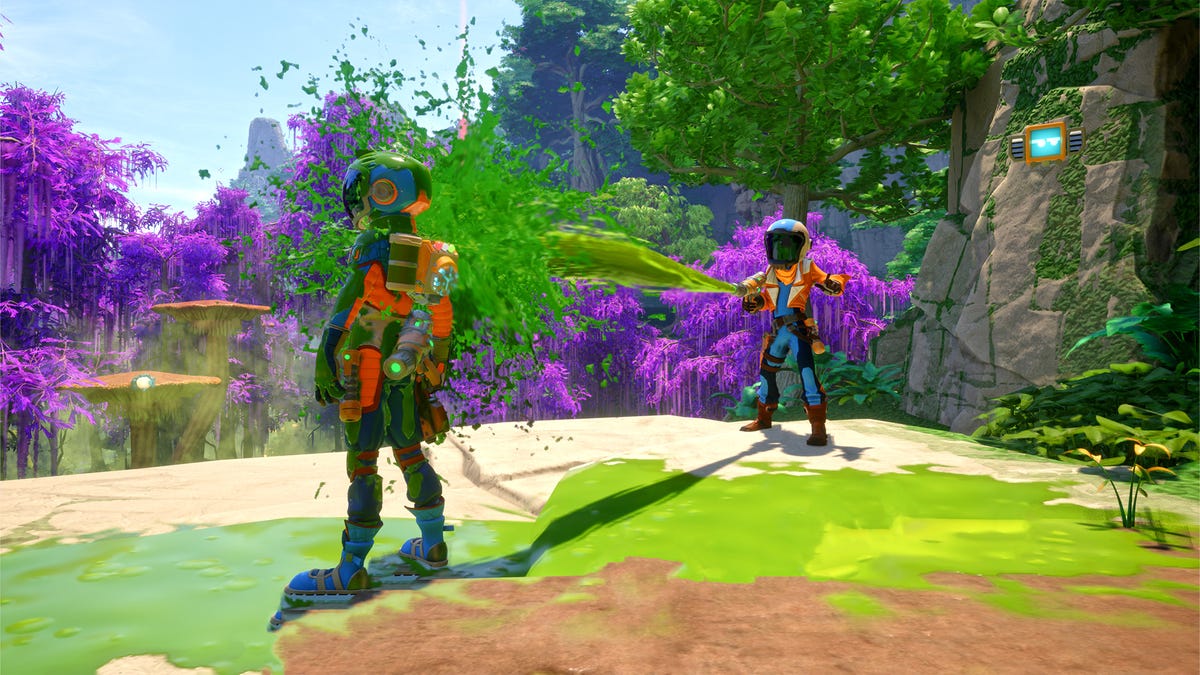Journey to the Savage Planet is a 2020 first-person Metroidvania that sold pretty well and was absolutely fantastic if you played it, but strangely there’s a really high chance you’ve never heard of it. It’s a fate all too often reserved for bright, colorful, fun-first games that don’t obey the industry’s furrowed brow of grimdark severity. Well, apart from the ones with Pokémon in them.
Revenge of the Savage Planet takes the explosively bright and cheerful nature of the original and makes it bigger, brighter, bouncier, changes to third-person, and then uses all that to tell a satirical parable of the state of modern capitalism and the games industry.
There’s a reason for that latter twist. Developers Raccoon Logic, who were once developers Typhoon Studios, have been through some shit. At the height of Google’s extravagant and wildly overconfident plans for disastrous streaming service Stadia, the company bought Typhoon as an in-house developer, before unceremoniously “spitting us back out” (as co-founder Alex Hutchinson, former creative director on Far Cry 4 and Assassin’s Creed III says during our hands-on demo) a few months later. In order to retain the rights to their Savage Planet IP, they sold the first game to publishers 505 Games such that they don’t see a penny of its sales, and…well, you can see why the game pitches itself as set “in a future knocked off its axis by corporate greed and stupidity.”
So it is with quite some triumph that both Hutchinson and co-founder Reid Schneider (executive producer on Mad Max, Arkham Origins, and Army of Two) declared that this new, far larger, far more ambitious sequel is being self-published.
Like the original game, Return to the Savage Planet is a sprawling, 3D Metroidvania set on a bonkers planet (or in this case, four planets), populated by wonderfully bizarre creatures to be shot at, kicked, or this time, captured and taken to your base to be kept in pens and, er, experimented upon.
Set in the same universe, but in a different time and setting, your space exploring company was recently bought by a large multinational corporation, Altar, who then sent you on a deep-space exploratory mission one hundred years’ flight away. However, 20 years into your cryo-sleep, you realize that the work is “expensive and difficult, so decide to get out of the sector entirely.” Yeah, it’s not exactly subtle.

Revenge Of The Savage Planet demo
When you land on the planet you were supposed to be exploring, you learn that you were made redundant 80 years ago, and all the equipment and buildings and items you needed have been scattered across different planets. As Hutchinson put it, “One thing I’ve discovered is that satire and science fiction are never about the future, they’re always about right now.”
You then have to reach all that equipment and gather everything you need to rebuild a spaceship in order to return to Earth for your revenge. This is done through third-person exploration, with an ever-growing suite of abilities that allow you to reach previously impossible ledges, or break down sealed doors—you know the Metroidvania drill.
What makes Savage Planet stand out is just how plain weird it all is. This is a game where you fight hostile creatures by squirting them with a water gun until they absorb so much liquid they expand into vast platforms to jump on, or you leave trails of goo toward a host of slimes (here translucent cubes containing a wealth of rolling googly eyes) and then set it on fire, which might accidentally burn a larger, meaner beast who wakes up another bunch of critters, and suddenly you’re flailing to cope with a mad onslaught before running, jumping, and knee-sliding your way out of trouble.
As you play, more planets will be unlocked, with their own biomes and unique sets of creatures. You’ll also be collecting parts for building and improving your own home, decorating it with furniture and features sent ahead by Altar, their defining feature being that all are utterly impractical and functionally useless. (Rather brilliantly, you have to buy these with a currency found as you explore, Altar willing to still take your money for pointless gubbins, but not to make any attempt to rescue you.) At a certain point you’ll be exploring a whole little village of temporary homes, once intended for those who were to follow you, now never to be filled.
During the demo, played by the game’s lead producer, chaos often ensued, which just added to the sequel’s allure. And that chaos is apparently even more fun in the new co-op modes, whether played remotely or in splitscreen, where your buddy goofing and getting you into a whole heap of trouble creates all the right sorts of fights. But, importantly, these are escapable situations, not amusing game overs.
The third-person view has necessitated a few changes. The most crucial being you can no longer slap everything in the game, which just didn’t work in this new perspective. So now you can kick everything instead. It also offers a pile of new visual gags, not least the absolutely hilarious jogging and running animations, with ludicrously thrusted arms and legs that made me laugh every time I saw them. There will also be a collection of suits to wear, each treading dangerously close to others’ IP. After I had nerdily noticed a Star Trek VI reference Hutchinson made about some of the enemies having their gonads on their knees, he asked for a Star Trek red shirt uniform. I asked why the character didn’t immediately get killed? Before the question was over, Hutchinson interrupted me to say, “You will at launch! Put this outfit on and you’re immediately dead! Before we bring you back to life to carry on.” This new perspective was also chosen because it worked better for the platforming, not just for funsies.
Talking of which, the 30-person company (“How are you managing to keep the team from bloating bigger?” I asked. “By not having any money,” Alex Hutchinson replied) is putting the welfare of its developers ahead of the game’s production. There’s been no crunch, and there are no plans to ever crunch, although entering the last six months of development will likely stress-test this resolve. But this is a company that has risen phoenix-like from the ashes of corporate idiocy, and seems determined to now do things on their own terms. Let’s be clear—it’s not normal in this industry to be quite so honest about their disastrous interactions with massive corporations, and the freedom to do so is clearly being relished.
From my short but superbly entertaining glimpses of Return to the Savage Planet, it seems like this is being channelled for good, the larger themes containing the satirical venom, no spite reaching the gleeful silliness and rock-solid action of playing the game moment to moment. Unless, er, look, I’m really not sure what they meant by experimenting on captured creatures.
.

